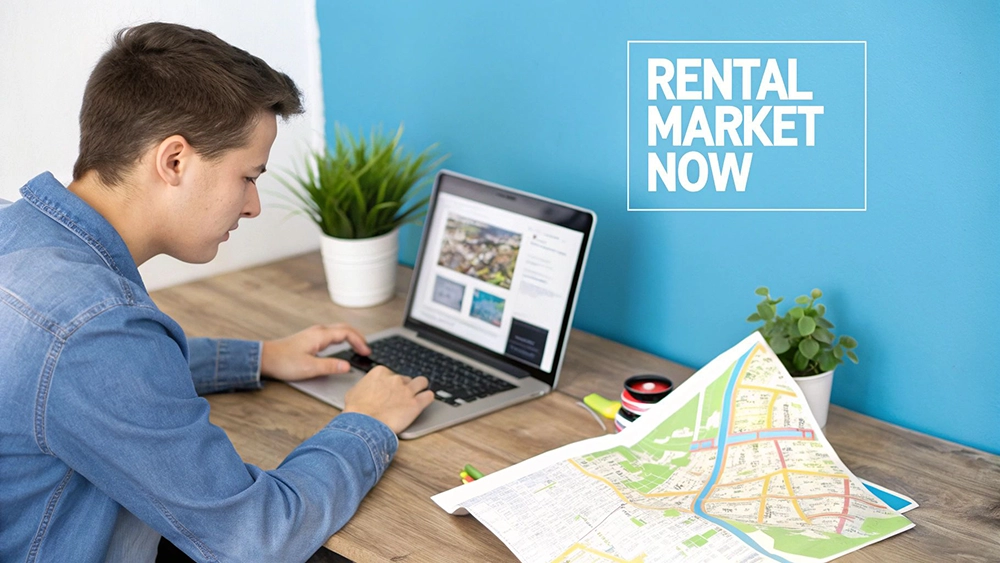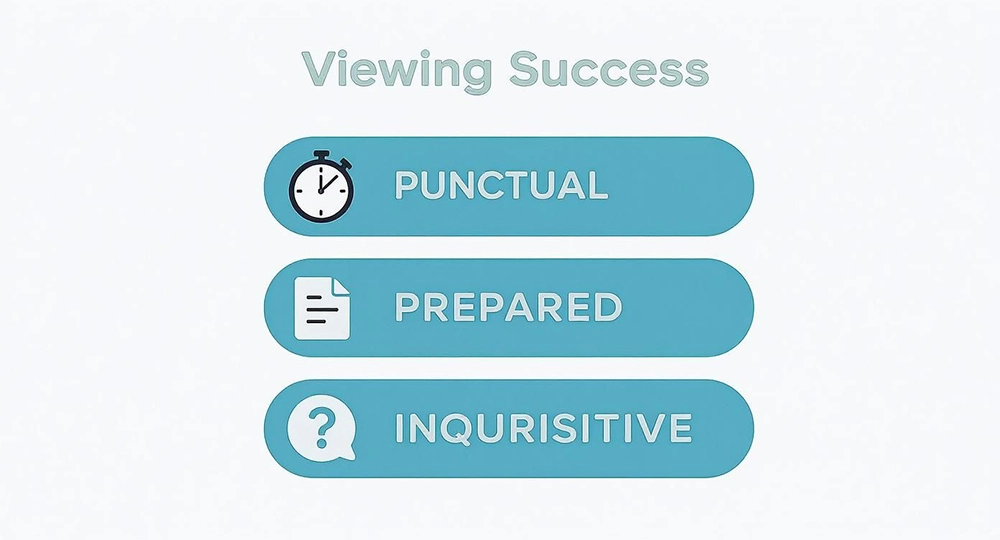Trying to find a room to rent near me in the UK can feel like a real uphill battle. With huge demand and costs that just keep climbing, the whole search can be a massive challenge. To get ahead today, you’ve got to be organised, strategic, and ready to move fast when a decent opportunity pops up. The first step, though, is getting your head around what the market actually looks like right now.
Understanding the UK Rental Market Today

If your search for a room feels harder than you thought it would be, trust me, you’re not alone. The UK rental scene is one of the most competitive it has ever been. This isn't just about high prices; it's a simple, frustrating imbalance between the number of people looking for rooms and the number of rooms actually on the market.
This intense competition means that when a good room gets listed, landlords are often swamped with enquiries within hours. Being prepared isn't just a good idea anymore—it's absolutely essential.
The Numbers Behind the Search
A quick look at recent data shows just how much pressure the market is under. According to an analysis by Rightmove, the total supply of rental properties is still 23% lower than it was in 2019, even with a small increase in available homes this year. This ongoing shortage is what’s driving the fierce competition, pushing the average asking rent for a room in the UK to a record-breaking £1,385 per calendar month as of October 2025. You can dig deeper into these trends in their latest rental market update.
So, what does this actually mean for your search?
- Speed is Crucial: Good rooms are often gone within days, sometimes even hours, of being advertised.
- Preparation is Key: Having your documents and deposit ready to go can instantly make you a landlord's top choice.
- Flexibility Helps: If you’re open to different neighbourhoods or types of properties, you’ll have a much wider pool of options.
The reality is that landlords can afford to be picky. Your job is to make sure you come across as the most reliable, organised, and serious prospective tenant they’ll meet.
Why Being Strategic Matters
Mindlessly scrolling through listings just doesn't cut it anymore. You need a proper, proactive strategy that puts you one step ahead of everyone else. This means setting up instant alerts on rental platforms, creating a renter profile that sells you well, and knowing exactly what you’re looking for before you even think about viewings.
For more practical tips on getting everything in order, you might find the guides in our tenant resources section really helpful. Understanding this landscape is what allows you to make smart, quick decisions when you find a place you love, turning what could be a stressful hunt into a successful one.
Winning the Search on Rental Platforms

Your hunt for a room to rent nearby will almost certainly kick off online. But in a market that moves this fast, just browsing platforms like RoomsForLet, SpareRoom or Rightmove isn't enough. It's a passive approach that will leave you trailing behind.
To get ahead, you need to stop aimlessly scrolling and start a targeted mission. It's all about using these platforms strategically—that means optimising your profile, setting up laser-focused alerts, and knowing exactly where to put your energy for the best results.
Create a Renter Profile That Stands Out
Before you even think about looking at listings, your first job is to build a renter profile that actually gets noticed. Think of it as your digital handshake. It’s the very first impression a landlord or potential housemate will have of you.
A vague, incomplete profile is the easiest thing in the world to ignore, especially when dozens of other people are applying for the same room. Your mission is to present yourself as the ideal housemate: reliable, responsible, and respectful.
Go beyond just your name and job title. Add a friendly, recent photo and write a short, sharp bio that covers:
- Your Profession: Briefly say what you do. It gives a bit of context and shows you’re stable.
- Your Lifestyle: Give a sense of your routine. Are you a quiet, work-from-home type, or are you more sociable and out and about most evenings?
- What You're Looking For: Be specific about the kind of household you’d be a good fit for. This shows you've actually thought about the living arrangement, not just the physical room.
A well-crafted profile that screams reliability makes a massive difference. Landlords want someone who pays on time and looks after their property. Your profile is your first—and sometimes only—chance to prove you're that person.
Set Up Hyper-Specific Alerts
Let's be real: the best rooms are often gone within hours of being listed. If you’re only checking websites once a day, you’re already too late. This is where alerts become your secret weapon.
Don’t just set up a broad alert for "a room in Manchester." You need to get granular.
Filter your alerts by:
- Specific Postcodes: Target the exact neighbourhoods you actually want to live in.
- Price Range: Set a realistic maximum rent to stop you from wasting time on places you can't afford.
- Key Amenities: Filter for your non-negotiables, like an en-suite, parking, or an all-bills-included deal.
- Move-In Date: Line up the alerts with when you actually need to move.
By setting up these super-detailed notifications, you guarantee you’re one of the first people to see a new listing that fits you perfectly. That speed gives you a critical head start, letting you get your enquiry in before the competition even knows the room exists.
When you're ready, you can search for thousands of rooms to rent across the UK and set up your own tailored alerts to get ahead of the game.
Focus on the Right Platforms
Not all rental websites are built the same, and spreading yourself too thin is a recipe for frustration. It’s far better to focus your energy on the platforms that are most relevant to what you’re looking for.
Deciding where to look can be half the battle. To help you focus your search, here's a quick comparison of the big players in the UK market.
UK Rental Platform Comparison
| Platform | Best For | Key Feature | Potential Drawback |
|---|---|---|---|
| RoomsForLet | Finding rooms in shared houses & connecting directly with landlords. | Specifically designed for the shared living market with a user-friendly interface. | May have fewer listings for entire properties compared to larger portals. |
| SpareRoom | Finding rooms in established flatshares and connecting with potential housemates. | Buddy-up feature helps you find other renters to search with. | Very popular, meaning competition for good rooms can be fierce. |
| Rightmove | A huge volume of listings for both rooms and entire properties. | Massive inventory and advanced search filters. | Not specifically for sharers, so can be harder to find the right dynamic. |
| Zoopla | Detailed local area data and property market insights alongside listings. | Provides useful data on running costs and local market trends. | Similar to Rightmove; can feel less personal for room-only searches. |
| Facebook Marketplace | Finding informal, direct-from-landlord listings and short-term lets. | Often has no fees and allows for quick, direct communication. | Less vetting and security, requiring more caution from the renter. |
Each platform has its strengths. Using a dedicated site like RoomsForLet or SpareRoom is often the most efficient way to find a room in a shared house, but don't completely discount local Facebook groups or even Gumtree, where you can sometimes find a hidden gem advertised directly by a live-in landlord. It’s all about being smart with your time.
How to Spot and Avoid Common Rental Scams

When you're desperate to find a room to rent near you, it’s all too easy to let your guard down. Scammers absolutely prey on this sense of urgency, crafting convincing but fake listings designed to steal your money and personal details.
The good news? Most rental scams share the same obvious red flags, as long as you know what you’re looking for.
The biggest giveaway is a deal that seems too good to be true. A beautifully furnished double room in a prime city-centre spot for half the going rate should set alarm bells ringing immediately. Scammers use these unrealistic prices to lure in as many potential victims as possible, and fast. You can learn more about room-rent scams here.
Common Scammer Tactics
Another classic tactic is the "landlord is abroad" story. They'll spin a tale about having to leave the country unexpectedly for work or a family emergency, which is why they conveniently can't show you the room in person. This excuse is designed purely to rush you into making a decision and sending money without ever setting foot inside the property.
You’ll often find they pile on the pressure for an immediate deposit to "secure" the room, mentioning how much demand there is from other interested renters. Any legitimate landlord will almost always insist on a viewing before a single penny changes hands.
A key takeaway is to never send money for a property you haven't seen in person. No legitimate landlord will ask you to pay a deposit or the first month's rent just to secure a viewing. This is one of the brightest red flags in the rental world.
Your Safety Checklist Before Sending Money
Protecting yourself requires a healthy dose of scepticism and a methodical approach. Before you even think about transferring a holding deposit, make sure you run through these essential checks.
- Insist on a Viewing: Always, always view the property in person. If you genuinely can't make it, ask a trusted friend to go for you. A landlord who refuses or makes endless excuses is a massive red flag.
- Verify the Landlord: Ask for proof that they own or manage the property. For a small fee, you can even check the Land Registry to see who the legal owner is.
- Question the Photos: Do the images look a bit too perfect, like professional stock photos? Use a reverse image search (like Google Images) to see if they’ve been lifted from another website, like an estate agent’s page or even an Airbnb listing.
- Avoid Cash Payments: Never pay a deposit in cash or via an untraceable wire transfer. Always use a bank transfer, as it creates a digital paper trail that offers you far more protection.
If something feels off about a listing or a conversation with a supposed landlord, it’s always better to walk away. If you have any concerns or need to report a potential scam on our site, you can get in touch with our support team using the details on our contact page.
Trust your gut—it could save you hundreds, or even thousands, of pounds.
Making a Lasting Impression at Viewings
Getting a viewing confirmed is a great step forward, but it’s only half the battle. Now you have to make that short visit count. When landlords are weighing up multiple applicants, how you come across can genuinely be the deciding factor.
This isn't just about being polite; it's about showing you're the low-risk, reliable person they’re hoping to find. The small things really do add up. Arriving on time, being ready with any documents you might need, and showing genuine interest in the property sets a positive tone from the get-go.
Be Prepared and Proactive
Walking into a viewing empty-handed is a missed opportunity. The smartest renters I know treat it like a friendly interview—they show up prepared to both answer questions and ask their own. It immediately signals that you're serious and organised.
Before you even leave the house, get a few things in order:
- A mental checklist: Know your absolute must-haves and the key things you need to check. Does the shower have decent pressure? Is there a phone signal in the bedroom?
- Your documents ready: It’s not always necessary at this stage, but having digital copies of your ID and proof of income saved on your phone shows you mean business.
- A positive attitude: Landlords and potential housemates are looking for someone who will be easy to live with. A friendly and respectful vibe goes a very long way.
This proactive approach puts you leagues ahead of less organised people. You're not just looking for any room to rent near you; you're showing you’ll be a responsible and communicative housemate right from day one.
Ask the Right Questions
The viewing is your best chance to get the crucial information that was missing from the online advert. Remember, this is a two-way street. You’re interviewing the landlord and the property just as much as they're interviewing you. Try to move beyond the basic questions about bills and dig a little deeper.
You're trying to figure out the reality of living in that specific room and house. Asking thoughtful questions shows you’re a serious applicant who thinks ahead, not just someone desperate for any four walls.
Think about asking things like:
- Maintenance and Repairs: "What's the process if something like the boiler breaks down? Who’s the best person to contact?"
- Noise Levels: "What are the noise levels like, both from neighbours and within the house, especially in the evenings?"
- Neighbourhood Vibe: "Are there any local spots you'd recommend, or any particular areas to be aware of?"
- Previous Tenant Turnover: "How long did the last person stay? What’s the general turnover like here?"
These sorts of questions give you a much clearer picture of what life would be like there, and they signal to the landlord that you’re a diligent and considerate individual.
Inspect the Property Thoroughly
While you're chatting, don’t forget to give the property a proper once-over. It’s so easy to get distracted by a fresh coat of paint or nice furniture, but you need to keep an eye out for potential problems that could become major headaches down the line.
Pay close attention to the condition of shared spaces like the kitchen and bathroom. What’s the state of the appliances—are they clean and working properly? In your potential room, look for signs of damp, like peeling paint, a musty smell, or dark patches on the walls, especially around windows and in corners. Check that the windows open, close, and lock as they should. A thorough inspection means you’ll walk away fully informed and ready to make a confident decision.
How Rental Markets Differ Across the UK
Trying to find a room in central London is a completely different ball game to hunting in Liverpool or Glasgow. The UK’s rental market isn’t a single, unified thing; it's a patchwork of dozens of local markets, each moving at its own pace with unique price points, competition levels, and availability.
Getting your head around these regional differences is vital. It stops you from applying a one-size-fits-all strategy where a much more local, targeted approach is needed. What works in a university city with a constant churn of students won’t be nearly as effective in a quiet commuter town.
The North-South Price Divide and Beyond
It’s no secret that London and the South East are the most expensive places to rent, but the story is more nuanced than a simple north-south split. Some areas are seeing shockingly fast rent growth, creating intense competition in places you might not expect.
For example, while the UK average monthly rent hit £1,344 in June 2025, the reality on the ground varies wildly. Towns like Chippenham saw a staggering 16.4% annual rent rise, while the North East led the UK with a 9.7% growth rate—even though it’s still the most affordable region overall. You can explore more of this regional data to see just how much the rental market shifts from one postcode to another.
This all means your budget and expectations have to be grounded in local reality. A budget that lands you a premium room in one city might barely cover a small single in another.
Urban Hotspots vs Commuter Towns
Big cities like Manchester, Bristol, and Edinburgh will always have fierce demand thanks to jobs, universities, and transport links. This creates a fast-paced environment where you absolutely have to act quickly or miss out.
In contrast, smaller towns or suburban areas often offer better value for money and a less frantic search. The trade-off, of course, might be convenience and amenities for lower rent. Looking at these satellite locations can be a smart way to find a room to rent near you without breaking the bank, as long as the commute is manageable.
Your search strategy should directly reflect the local market you're in. In a high-demand city, speed and preparation are everything. In a quieter area, you may have more time to weigh your options and find the perfect fit.
The infographic below breaks down the three core pillars of a successful viewing, which are critical no matter how competitive your local rental market is.

Being on time, having your documents ready, and asking smart questions shows you’re a serious and reliable applicant. In a tough market, that’s how you stand out.
Got Questions About Renting a Room? We’ve Got Answers.
Jumping into the rental market can feel like learning a new language, with a whole host of questions popping up, especially if you're a first-timer. Getting clear answers is the key to moving forward with confidence and sidestepping any potential headaches.
Let’s tackle some of the most common queries we see from people looking for a room to rent.
What Documents Will I Need to Rent a Room in the UK?
In a competitive market, being prepared is your superpower. It pays to get your documents sorted before you even start arranging viewings. Landlords and agents will almost certainly ask for a few key things, and having them ready to go in a digital folder shows you’re a serious and organised applicant.
You'll almost always need:
- Photo ID: A clear copy of your passport or driving licence.
- Proof of Address: A recent utility bill or bank statement, usually dated within the last three months.
- Proof of Income: Your last three payslips are standard, but an employment contract or a formal letter from your employer will also do the trick.
- References: Have the contact details ready for a previous landlord and your current employer.
- Right to Rent: If you're not a British or Irish citizen, you’ll need to generate a 'share code' from the government website to prove your right to rent in the UK.
Having these files on hand means you can pounce the moment you find the perfect room, putting you ahead of the competition.
How Much Deposit Can a Landlord Legally Ask For?
This is a really common point of confusion, but thankfully, UK law is very specific on this. The Tenant Fees Act 2019 put a legal cap on how much a landlord can ask for as a tenancy deposit.
If your total annual rent is under £50,000, the absolute maximum deposit a landlord can legally request is five weeks' rent. If the yearly rent is £50,000 or more, this cap rises to six weeks' rent. A landlord simply cannot ask for more than this.
A crucial point here: it's a legal requirement for your landlord to protect this deposit in a government-approved tenancy deposit scheme (TDP). They must also provide you with all the details within 30 days. This is your safety net, ensuring your money is held securely and any disputes at the end of the tenancy are handled fairly.
What’s the Difference Between a Holding Deposit and a Tenancy Deposit?
It’s vital to know the difference between these two payments.
A holding deposit is a much smaller sum you pay to a landlord or agent to reserve a room. Think of it as a sign of your commitment. This payment takes the property off the market while they run your referencing checks. By law, this is capped at one week's rent.
Once your application gets the green light, this money is usually put towards your first month's rent or the main tenancy deposit.
The tenancy deposit, as we covered above, is the much larger sum (up to five or six weeks' rent) that acts as security for the landlord for the duration of your stay. A massive red flag for any rental scam is being asked for a huge "holding fee" before you've even set foot in the property.
Should I Sign a Tenancy Agreement I Don't Understand?
Absolutely not. Never, ever. A tenancy agreement is a legally binding contract, and it’s so important that you understand everything you’re agreeing to. When things are moving fast, it can be tempting to just sign on the dotted line, but this is exactly where costly mistakes happen.
Take your time and pay close attention to clauses about:
- Rent increase terms
- Break clauses (your right to end the tenancy early)
- Who is responsible for what repairs
- Any specific house rules
If a single sentence seems unclear, ask the landlord or agent for an explanation in writing. Don't be shy about seeking free, impartial advice from organisations like Citizens Advice or Shelter before you commit. A good landlord will always be happy to clarify things to make sure you’re comfortable.
Finding the right room can feel complicated, but having the right info makes all the difference. At Rooms For Let, we connect you directly with landlords all over the UK, making your search simpler and more straightforward. Ready to begin? Start your search for rooms to rent today at https://www.roomsforlet.co.uk.